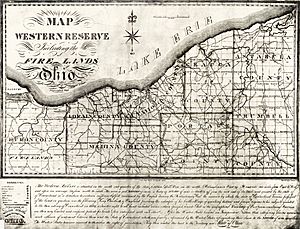John Leavitt (Ohio settler) facts for kids
John Wheeler Leavitt (1755–1815) was an important early settler in Ohio. He was born in Suffield, Connecticut, and later moved to the Connecticut Western Reserve, a large area of land in Ohio that Connecticut used to own. His family bought a lot of this land. Captain Leavitt became a well-known innkeeper, politician, and landowner in Warren, Ohio, which is in Trumbull County, Ohio.
Leavitt was part of the Connecticut Land Company. With his cousin Ebenezer King, he paid over $51,000 for about 78,500 acres (318 km2) of land in Ohio. This huge purchase included the area where the town of Warren would later be built. The Leavitt family played a big part in the history of Warren and Ohio.
John Leavitt's Early Life
John Wheeler Leavitt was the son of Abiah (Kent) Leavitt and John Leavitt. His father was a carpenter, farmer, and landowner in Suffield, Connecticut, where his family was among the first settlers. John Leavitt's brother, Thaddeus Leavitt, was a well-known merchant in Suffield. Thaddeus was one of the first eight people to buy the Connecticut Western Reserve from the state of Connecticut in 1796. Other family members also bought land there, including Oliver Ellsworth. Oliver's son, Henry Leavitt Ellsworth, later visited the Reserve to check on his family's land. He even stayed at Captain John Leavitt's inn!
Captain John Leavitt was a farmer and merchant. He married Silence Fitch in Suffield in 1777. In 1800, John and Silence Leavitt moved to the Connecticut Western Reserve. The town of Leavittsburg, Ohio, was named after their family. People hoped it would become a major market town for Trumbull County. John Leavitt also helped start other towns like Aurora, Ohio, and Mantua, Ohio.
How Warren Was Founded
When Captain Leavitt arrived in the Western Reserve, he realized that the future town of Warren was a better spot than Leavittsburg. Warren had more open land and better places to build mills. The land that became Warren was originally owned by Ebenezer King Jr. and Captain Leavitt. In the summer of 1800, Captain Leavitt built a small cabin on the west side of what would become Warren's Main Street. He then went back to Connecticut and returned to Warren the next year with his wife, Silence. They had eight children, and many of them later moved to Ohio.
Some stories say that when Leavitt first arrived, the area around Warren had a lot of rattlesnakes. One early account, written when Warren had only 16 settlers, describes a snake hunt where 486 rattlesnakes were caught! The observer wrote that "rattlesnakes abounded in some places." Settlers used sticks to chase the snakes from their rocky hiding spots into their dens. This hunt was a big success, and the dead snakes were piled up. Many of them were thicker than a man's leg and over five feet long!
Despite the snakes, Warren's location was excellent. It quickly became the most important town in the Mahoning Valley region. The Mahoning Valley Historical Society noted that "Warren had influence that Youngstown did not possess," showing how important Warren was early on. Other settlers also chose to move to Warren instead of Leavittsburg because of its better location.
Soon after arriving, Captain Leavitt turned his new home into the first inn and tavern in Warren. Many other family members followed him to Warren. His son, John Jr., known as 'Esquire John,' became the county treasurer before he died in Warren in 1815. Captain John's brother, Samuel, known as 'Esquire Samuel,' was born in Suffield in 1756. When he visited Warren in 1800, he bought a farm next to his nephew John Jr.'s farm. Samuel Leavitt moved to Warren permanently in 1802 with his wife, Abigail Kent Austin.
Important Family Members
Many members of the Leavitt family became important figures in Ohio. Samuel Leavitt served as a state representative in the Ohio House of Representatives. John Leavitt Jr. was the treasurer for Trumbull County. Humphrey Howe Leavitt, Captain John Leavitt's son, became a U.S. Congressman and later a U.S. District Court judge. Daniel Leavitt was the first public school teacher in Warren. Captain John Leavitt, the first family settler, was the leader of the local militia, which is where he got his title of 'Captain.'
Like most pioneers, the Leavitt family had to create the first services in the area. John Leavitt Jr. started the first public school. Captain John Leavitt's inn and tavern became the center of Warren's growing community. It even served as a temporary meeting place for the region's first military leaders. The first race track in the area was built on the Leavitt farm. It had a large grandstand for people to watch the races. Later, a canal built through the farm destroyed the race track site.
Eventually, more members of the extended Leavitt family from Suffield moved to Ohio. This included Enoch Leavitt (born in 1746), known as 'Esquire Enoch.' He bought the land where most of the town of Warren now stands. Enoch died in 1815 and was buried in the family cemetery in Leavittsburg, like most of the Leavitt family. Leavittsburg was mostly a wooded area without many buildings. Enoch's son, Enoch Jr., became a well-known local doctor. He lived on his farm in Leavittsburg and by the time he died in 1827, at age 52, he owned about 1,000 acres (4 km2) of land in Trumbull County.
Leavittsburg, the town named for the early Ohio family, had a gristmill for many years, but it never grew very large. Today, it is still mostly rural. It is also the location of the Leavitt family cemetery, where many family members are buried. Captain John Leavitt, the first Leavitt settler in Ohio, died in Warren in 1815.
Images for kids
 | Anna J. Cooper |
 | Mary McLeod Bethune |
 | Lillie Mae Bradford |



